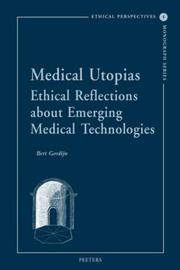| Listing 1 - 10 of 37 | << page >> |
Sort by
|
Book
ISBN: 9056251678 9789056251673 Year: 2004 Publisher: Nijmegen Valkhof
Abstract | Keywords | Export | Availability | Bookmark
 Loading...
Loading...Choose an application
- Reference Manager
- EndNote
- RefWorks (Direct export to RefWorks)
In de geneeskunde worden steeds vaker genetische tests toegepast. Zo is het steeds beter mogelijk – nog voordat er ook maar enig symptoom zichtbaar is – het risico te bepalen dat iemand later een bepaalde ziekte zal ontwikkelen. Ook bij ongeboren kinderen kan dit onderzocht worden. Bovendien kan ook vóór de bevruchting al gekeken worden hoe groot de kans is dat een bepaald paar een kind met een genetische aandoening ter wereld zal brengen. Al deze nieuwe mogelijkheden in de diagnostiek zijn het resultaat van vooruitgang op het gebied van genetische tests. Doel van dit soort tests is het geven van informatie. Hierdoor zou men in staat worden gesteld in vrijheid weloverwogen keuzes te maken. Op die manier zouden genetische tests een bijdrage leveren aan de verhoging van de autonomie. Maar de snelle ontwikkeling van genetische tests wordt niet door iedereen als onverdeeld positief beschouwd. Zo zou het gevaar bestaan van ongewenste kennis, nieuwe vormen van eugenetica, genetische discriminatie en verlies van privacy. Vormen de in snel tempo toenemende kennis over ons erfelijk materiaal en de daarmee verbonden nieuwe erfelijkheidsdiagnostiek een doos van Pandora? Of zullen zij uiteindelijk een nuttige bijdrage leveren aan betere preventie en therapie? Dit boek neemt deze vraag op een concreet niveau onder de loep en gaat in op een aantal actuele probleemvelden die samenhangen met de snelle ontwikkeling van genetische tests.
Professional ethics. Deontology --- #GBIB:CBMER --- genetische test --- prenatale diagnostiek (prenatale test) --- genetische diagnostiek (diagnose) --- erfelijkheid (erfelijke aanleg) --- Genetica --- Medische ethiek --- Preventieve geneeskunde --- Eugenetica --- 604 --- borstkanker --- erfelijke ziekten --- ethiek (moraal) --- genetisch advies --- genetisch risico --- gezondheidsrecht --- ovariumcarcinoom --- prenatale diagnose --- prenatale raadpleging --- test génétique --- diagnostic prénatal (test prénatal, DPN) --- diagnostic génétique --- hérédité (disposition héréditaire, prédisposition héréditaire) --- Génétique --- Ethique médicale --- Médecine préventive --- Eugénique --- (zie ook: gynecologie) --- (zie ook: genetisch advies) --- genetica --- erfelijkheid --- ethiek --- Provincie West-Vlaanderen

ISBN: 9042917008 9789042917002 Year: 2006 Volume: 4 Publisher: Leuven Peeters
Abstract | Keywords | Export | Availability | Bookmark
 Loading...
Loading...Choose an application
- Reference Manager
- EndNote
- RefWorks (Direct export to RefWorks)
The field of medicine is generally greeted with great enthusiasm. This can be witnessed in the immense support for medical progress, which is widely hoped to lead to a realization of idealized goals. Indeed, with the help of medicine the human body would be controllable and constructible, human nature perfectible. However, enthusiasm in favor of medical progress is first and foremost a sentiment and, like all sentiments, not necessarily a product of rational contemplation. People are capable of enthusing about the realization of utopian notions, such as life without disease or with the perfect body, without requiring any concrete arguments to back them up. Enthusiasm alone is not a guarantee of ethical desirability, however. Hence, this book takes a closer look at four research fields often referred to in medical utopian literature: 'tissue engineering', 'bioelectronics', 'germ line genome modification' and 'interventions in the biological aging process'. They serve as a basis for analyzing whether ethical arguments can be found to support the euphoric advocacy of the further development of these fields.
Ethique médicale --- Medische ethiek --- Medical ethics --- Bioethics --- Utopias --- verbetergeneeskunde (mensverbetering) --- transhumanisme (cyborg) --- posthumanisme --- biomedische technologie --- lichaamsmateriaal (lichaam, menselijk lichaamsmateriaal) --- bionica (bio-elektronica) --- kiemcel (kiemcellijn, embryonale kiemcel, germinale stamcel) --- germinale gentherapie --- veroudering (verouderingsproces) --- médecine de l'amélioration (médecine d'amélioration) --- transhumanisme --- technologie biomédicale --- matériel corporel humain, (corps humain) --- bionique (bioélektronique) --- cellule germinale (lignée germinale, cellule embryonnaire germinale, cellule souche germinale) --- thérapie génique germinale --- vieillissement --- Ideal states --- States, Ideal --- Utopian literature --- Political science --- Socialism --- Voyages, Imaginary --- Dystopias --- Biomedical ethics --- Clinical ethics --- Ethics, Medical --- Health care ethics --- Medical care --- Medicine --- Professional ethics --- Nursing ethics --- Social medicine --- Biology --- Life sciences --- Life sciences ethics --- Science --- Moral and ethical aspects
Book
Year: 1999 Publisher: Berlin Springer
Abstract | Keywords | Export | Availability | Bookmark
 Loading...
Loading...Choose an application
- Reference Manager
- EndNote
- RefWorks (Direct export to RefWorks)

ISBN: 352545709X Year: 2003 Publisher: Göttingen Vandenhoeck und Ruprecht
Abstract | Keywords | Export | Availability | Bookmark
 Loading...
Loading...Choose an application
- Reference Manager
- EndNote
- RefWorks (Direct export to RefWorks)
Bioethics --- Medical ethics --- Utopias
Book
ISBN: 9781402088513 9781402088520 1402088515 9789048180059 Year: 2008 Publisher: S.l. Springer
Abstract | Keywords | Export | Availability | Bookmark
 Loading...
Loading...Choose an application
- Reference Manager
- EndNote
- RefWorks (Direct export to RefWorks)
As we are increasingly using new technologies to change ourselves beyond therapy and in accordance with our own desires, understanding the challenges of human enhancement has become one of the most urgent topics of the current age. This volume contributes to such an understanding by critically examining the pros and cons of our growing ability to shape human nature through technological advancements. The authors undertake careful analyses of decisive questions that will confront society as enhancement interventions using bio-, info-, neuro- and nanotechnologies become widespread in the years to come. They provide the reader with the conceptual tools necessary to address such questions fruitfully. What makes the book especially attractive is the combination of conceptual, historical and ethical approaches, which makes it highly original. In addition, the well-balanced structure of the volume allows both favourable and critical views to be voiced. Moreover, the work has a crystal clear structure. As a consequence, the book is accessible to a broad academic audience. The issues raised are of interest to a wide reflective public concerned about science and ethics, as well as to students, academics and professionals in areas such as philosophy, applied ethics, bioethics, medicine and health management.
bio-ethiek (medische, biomedische ethiek, bio-ethische aspecten) --- verbetergeneeskunde (mensverbetering) --- transhumanisme (cyborg) --- posthumanisme --- geschiedenis (historische aspecten) --- ethiek (ethische aspecten) --- filosofie (filosofische aspecten) --- bioéthique (éthique médicale, biomédicale, aspects bioéthiques) --- médecine de l'amélioration (médecine d'amélioration) --- transhumanisme --- histoire (aspects historiques) --- ethique (aspects ethiques) --- philosophie (aspects philosophiques) --- Social ethics --- Medical law --- Medical innovations. --- Medical ethics.
Book
ISBN: 9783472076858 Year: 2010 Publisher: Köln Luchterhand
Abstract | Keywords | Export | Availability | Bookmark
 Loading...
Loading...Choose an application
- Reference Manager
- EndNote
- RefWorks (Direct export to RefWorks)

ISBN: 1402001266 9048158729 9401597065 Year: 2001 Volume: 8 Publisher: Dordrecht Kluwer Academic
Abstract | Keywords | Export | Availability | Bookmark
 Loading...
Loading...Choose an application
- Reference Manager
- EndNote
- RefWorks (Direct export to RefWorks)
In this book, developed by a group of collaborating scholars in bioethics from different European countries, an overview is given of the most salient themes in present-day bioethics. The themes are discussed in order to enable the reader to have an in-depth overview of the state of the art in bioethics. Introductory chapters will guide the reader through the relevant dimensions of a particular area, while subsequent case discussions will help the reader to apply the ethical theories to specific clinical problems and health policy queries. The book focuses on perspectives typical for the European context. This highlights not only particular bioethical themes such as social justice, choices in health care, and health policy (e.g., in post-communist countries), it also emphasizes specific approaches in ethical theory, in relation to Continental philosophies such as phenomenology and hermeneutics. Because of its articulation of what is typical for the European health care setting as well as for bioethical debate, this book is unique in comparison to existing textbooks in bioethics. The book is an introductory textbook acquainting the reader with the major issues in present-day health care as well as the various theoretical and practical approaches to clarify these issues.--An overview of salient themes in contemporary bioethics. It focuses on perspectives typical for the European context. This highlights not only particular bioethical themes such as social justice, choices in health care, and health policy, but also specific approaches in ethical theory--This title, developed by a group of collaborating scholars in bioethics from different European countries, gives an overview of the most salient themes in contemporary bioethics. Introductory chapters aim to guide the reader through the relevant dimensions of a particular area, while subsequent case discussions should help in the application of ethical theories to specific clinical problems and health policy queries.The book focuses on perspectives typical for the European context. This highlights not only particular bioethical themes such as social justice, choices in health care, and health policy (for ecxample, in post-communist countries), it also emphasizes specific approaches in ethical theory, in relation to continental philosophies such as phenomenology and hermeneutics.
Biology --- General ethics --- WB 60 Bioethics. Clinical ethics. Clinical ethics committees --- Europe --- Bioethics --- Medical ethics --- Ethique médicale --- Bioéthique --- #GBIB:CBMER --- Ethique médicale --- Bioéthique --- Biomedical ethics --- Clinical ethics --- Ethics, Medical --- Health care ethics --- Medical care --- Medicine --- Life sciences --- Life sciences ethics --- Moral and ethical aspects --- Professional ethics --- Nursing ethics --- Social medicine --- Science --- Life sciences. --- Ethics. --- Medicine—Philosophy. --- Medical ethics. --- Medicine—History. --- Life Sciences, general. --- Philosophy of Medicine. --- Theory of Medicine/Bioethics. --- History of Medicine. --- Deontology --- Ethics, Primitive --- Ethology --- Moral philosophy --- Morality --- Morals --- Philosophy, Moral --- Science, Moral --- Philosophy --- Values --- Biosciences --- Sciences, Life
Book
ISBN: 1402068166 1402068174 Year: 2014 Publisher: Dordrecht : Springer Netherlands : Imprint: Springer,
Abstract | Keywords | Export | Availability | Bookmark
 Loading...
Loading...Choose an application
- Reference Manager
- EndNote
- RefWorks (Direct export to RefWorks)
This volume assembles an interdisciplinary team of leading academics, industry figures, policymakers and NGO’s to consider the legal, ethical and social issues that are raised by innovations in nanoscience and nanotechnology. By bringing together international experts from a diverse range of fields this volume addresses the implications and impact that nanotechnology has on society. Through the exploration of six key themes the contributors analyse both the impact of nanotechnology and the emergence of the concept of nanoethics. Each section includes authors from both sides of the political and scientific divide – incorporating both positive and negative perspectives on nanotechnology, as well as including discussions of associated concepts such as converging technologies. The result provides for the widest and most balanced discussion of these issues to date.
Nanotechnology --- Social aspects. --- Moral and ethical aspects. --- Molecular technology --- Nanoscale technology --- Philosophy. --- Ethics. --- Law. --- Economic policy. --- Social sciences. --- Nanotechnology. --- Law, general. --- Social Sciences, general. --- R & D/Technology Policy. --- High technology --- Behavioral sciences --- Human sciences --- Sciences, Social --- Social science --- Social studies --- Civilization --- Economic nationalism --- Economic planning --- National planning --- State planning --- Economics --- Planning --- National security --- Social policy --- Acts, Legislative --- Enactments, Legislative --- Laws (Statutes) --- Legislative acts --- Legislative enactments --- Jurisprudence --- Legislation --- Deontology --- Ethics, Primitive --- Ethology --- Moral philosophy --- Morality --- Morals --- Philosophy, Moral --- Science, Moral --- Philosophy --- Values --- Mental philosophy --- Humanities
Book
ISBN: 1402088515 9048180058 1402088523 Year: 2008 Publisher: [Dordrecht] : Springer,
Abstract | Keywords | Export | Availability | Bookmark
 Loading...
Loading...Choose an application
- Reference Manager
- EndNote
- RefWorks (Direct export to RefWorks)
As we are increasingly using new technologies to change ourselves beyond therapy and in accordance with our own desires, understanding the challenges of human enhancement has become one of the most urgent topics of the current age. This volume contributes to such an understanding by critically examining the pros and cons of our growing ability to shape human nature through technological advancements. The authors undertake careful analyses of decisive questions that will confront society as enhancement interventions using bio-, info-, neuro- and nanotechnologies become widespread in the years to come. They provide the reader with the conceptual tools necessary to address such questions fruitfully. What makes the book especially attractive is the combination of conceptual, historical and ethical approaches, which makes it highly original. In addition, the well-balanced structure of the volume allows both favourable and critical views to be voiced. Moreover, the work has a crystal clear structure. As a consequence, the book is accessible to a broad academic audience. The issues raised are of interest to a wide reflective public concerned about science and ethics, as well as to students, academics and professionals in areas such as philosophy, applied ethics, bioethics, medicine and health management.
Medical innovations. --- Medical ethics. --- Biomedical ethics --- Clinical ethics --- Ethics, Medical --- Health care ethics --- Medical care --- Medicine --- Innovations, Medical --- Moral and ethical aspects --- Innovations --- Technological innovations --- Medicine. --- Ethics. --- Philosophy of mind. --- Social sciences. --- Medicine & Public Health. --- Medicine/Public Health, general. --- Philosophy of Mind. --- Social Sciences, general. --- Behavioral sciences --- Human sciences --- Sciences, Social --- Social science --- Social studies --- Civilization --- Mind, Philosophy of --- Mind, Theory of --- Theory of mind --- Philosophy --- Cognitive science --- Metaphysics --- Philosophical anthropology --- Deontology --- Ethics, Primitive --- Ethology --- Moral philosophy --- Morality --- Morals --- Philosophy, Moral --- Science, Moral --- Values --- Clinical sciences --- Medical profession --- Human biology --- Life sciences --- Medical sciences --- Pathology --- Physicians --- Bioethics --- Professional ethics --- Nursing ethics --- Social medicine --- Medical technology --- Health Workforce
Dissertation
Abstract | Keywords | Export | Availability | Bookmark
 Loading...
Loading...Choose an application
- Reference Manager
- EndNote
- RefWorks (Direct export to RefWorks)
| Listing 1 - 10 of 37 | << page >> |
Sort by
|

 Search
Search Feedback
Feedback About UniCat
About UniCat  Help
Help News
News